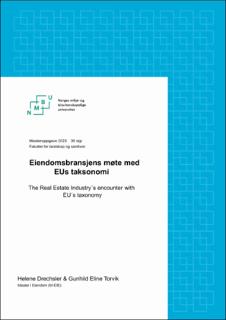| dc.contributor.advisor | Knut Boge | |
| dc.contributor.author | Drechsler, Helene Johansen | |
| dc.contributor.author | Torvik, Gunhild Eline | |
| dc.date.accessioned | 2023-07-15T16:27:49Z | |
| dc.date.available | 2023-07-15T16:27:49Z | |
| dc.date.issued | 2023 | |
| dc.identifier | no.nmbu:wiseflow:6839533:54591863 | |
| dc.identifier.uri | https://hdl.handle.net/11250/3079300 | |
| dc.description.abstract | Temaet for denne masteroppgaven er hvordan innføringen av EUs taksonomi påvirker aktører i eiendomsbransjen som driver med utvikling, forvaltning og investering. Kravene til rapportering på bærekraft og samfunnsansvar blir stadig strengere og mer omfattende.
For å oppfylle de ambisiøse målene som ligger i FNs bærekraftsmål og Parisavtalen, må sterke tiltak til. Ett av de mest sentrale verktøyene for å oppnå disse målene er EUs taksonomi, et klassifiseringssystem for bærekraftig finans. Formålet med innføringen av taksonomien er å styre kapital i en bærekraftig retning, redusere grønnvasking, og etablere en felles definisjon av hva som er bærekraftig.
Innføringen av EUs taksonomi er en stor omveltning for eiendomsbransjen og vil medføre endringer i hvordan hele bransjen jobber. Formålet med oppgaven er å bidra med kunnskap om hvordan innføringen av EUs taksonomi påvirker rammebetingelsene til utviklere, forvaltere og investorer i eiendomsbransjen.
Funnene i studien viser at innføringen av EUs taksonomi påvirker bedrifter i eiendomsbransjen som driver med utvikling, forvaltning og investering. Eiendomsbransjen har økt behov for, og etterspør kompetanse for å møte de strenge kravene i taksonomien og utfordringer på bærekraft. For at eiendomsbransjen skal bli mer bærekraftig er lovkrav avgjørende. Videre indikerer funnene våre at innføringen av taksonomien har ført til økt etterspørsel etter grønne bygg. Innføringen av EUs taksonomi reiser også spørsmål knyttet til den fremtidige aktualiteten til sertifiseringsordningen BREEAM.
Ved å undersøke hvordan utviklere, forvaltere og investorer responderer på innføringen av EUs taksonomi i lys av omdømme og samfunnsansvar, viser funnene at EUs taksonomi ikke har en direkte effekt i dette arbeidet enda. Ved innføringen av EUs taksonomi er det økt behov for samarbeid. Funnene viser at enn så lenge påvirker ikke samarbeidet konkurranseevnen til den enkelte aktør i eiendomsbransjen, men det kan tenkes at konkurransekraften vil øke når EUs taksonomi får et større fortfeste i eiendomsbransjen. EUs taksonomi driver frem innovasjon i eiendomsbransjen, men oppleves også til dels som en barriere.
Nøkkelord: EUs taksonomi, bærekraftig utvikling, innovasjon, samfunnsansvar og omdømme | |
| dc.description.abstract | The theme of this master thesis is how the introduction of the EU's taxonomy affects businesses in the real estate industry who are involved in property development, property management, and investment. Strong measures are needed to meet the ambitious goals of the UN's Sustainable Development Goals and the Paris Agreement. One of the most central tools to achieve these goals is the EU's taxonomy. The purpose the EUs taxonomy is to steer capital in a sustainable direction, reduce greenwashing, and establish a common definition of what is sustainable. The purpose of the assignment is to contribute knowledge about how the introduction of the EU's taxonomy affects the framework conditions for developers, managers, and investors in the real estate industry.
Findings in the study show that the introduction of the EU's taxonomy affects companies in the real estate industry that are involved in development, management, and investment. The real estate industry has an increased need for and demand for competence to meet the strict requirements of the taxonomy and challenges in sustainability. Legal requirements are crucial for the real estate industry to become more sustainable. Furthermore, our findings indicate that the introduction of the taxonomy has led to increased demand for green buildings in the real estate industry. The introduction of the EU's taxonomy also raises questions about the future relevance of the BREEAM certification scheme. It is too early to draw conclusions, but the findings in the study point to several findings for and against the relevance of BREEAM.
By examining how developers, managers, and investors respond to the introduction of the EU's taxonomy in light of reputation and social responsibility. The findings show that the EU's taxonomy does not have a direct effect in this work. With the introduction of the EU's taxonomy, there is an increased need for cooperation. The findings show that, for the time being, cooperation does not affect the competitiveness of the individual actor in the real estate industry, but it is possible that competitiveness will increase as the EU's taxonomy gains a stronger foothold in the real estate industry. The introduction of the EU's taxonomy drives innovation in the real estate industry but is also perceived as a barrier.
Keywords: EU's taxonomy, sustainable development, innovation, social responsibility, and reputation. | |
| dc.language | nob | |
| dc.publisher | Norwegian University of Life Sciences | |
| dc.title | Eiendomsbransjens møte med EUs taksonomi | |
| dc.type | Master thesis | |
